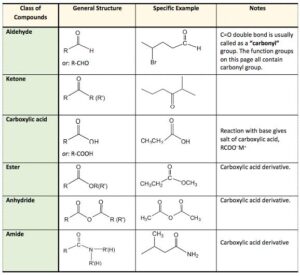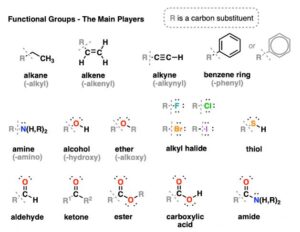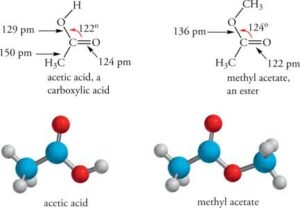Back to: Organic Chemistry 100 Level
Welcome to class!
Hey there, bright mind! I’m super happy to have you in class again. You’ve been doing so well, and today, we’re diving into a delicious part of Organic Chemistry. We’ll be talking about two sweet-sounding functional groups: Carboxylic Acids and Esters. These are not just chemicals in a lab—they’re part of things you use and smell every day, from vinegar in your kitchen to the sweet scent of your body spray. Let’s break them down together in the simplest and most relatable way.
Functional Groups III: Carboxylic Acids, Esters
What Are Carboxylic Acids and Esters?
Remember how functional groups are like the “personality” of a compound—the part that decides how it behaves? Well, Carboxylic Acids and Esters each have their own unique personality.

Carboxylic Acids (–COOH functional group)
Carboxylic acids are organic compounds that contain a special group called the carboxyl group. This group is written as –COOH, and it combines a carbon double-bonded to an oxygen (C=O) and also bonded to a hydroxyl group (–OH).
So, it’s like having two powerful features in one corner of the molecule!
General formula: R–COOH (where R is a carbon chain)
Examples:
Methanoic acid (HCOOH) – found in ant stings
Ethanoic acid (CH₃COOH) – also known as acetic acid, the main acid in vinegar
Butanoic acid (CH₃CH₂CH₂COOH) – found in some types of cheese
Naming carboxylic acids:
Take the name of the alkane and replace the –e at the end with –oic acid.
For example:
Methane → Methanoic acid
Ethane → Ethanoic acid
Uses of carboxylic acids:
Vinegar used in cooking contains ethanoic acid

Some are used in preserving food
Others are used in making soaps and detergents
So, the sour taste in that zobo drink or local salad? That’s carboxylic acid at work!
Esters (–COO– functional group)
Esters are sweet and fancy. They are made when a carboxylic acid reacts with an alcohol. The result is an ester and water. This reaction is called esterification.
General structure: R–COO–R’
The first part (R–CO) comes from the acid, and the second part (R’) comes from the alcohol.
Examples:
Ethyl ethanoate (CH₃COOC₂H₅) – smells like sweet fruits
Methyl butanoate – smells like pineapple
Naming esters:
First, name the part from the alcohol (with –yl) and then the part from the acid (with –oate).
For example:
Ethanol + ethanoic acid → Ethyl ethanoate
Methanol + butanoic acid → Methyl butanoate
Uses of esters:
Esters are used in perfumes and body sprays
They add flavour to soft drinks and sweets
Also used as solvents in industries
So that lovely scent from your body lotion or that sweet aroma in fizzy drinks? That’s an ester behind the magic!
Difference Between Carboxylic Acids and Esters
Carboxylic acids have a –COOH group and taste sour; esters have a –COO– group and smell sweet.

Acids are more reactive and used in cleaning or food preservation; esters are used for fragrance and flavour.
Acids end in –oic acid while esters end in –oate.
Summary
- Carboxylic acids contain the –COOH group and are found in things like vinegar and zobo.
- Esters are formed from acids and alcohols and are found in perfumes, sweets, and soft drinks.
- Carboxylic acids are sour and acidic, while esters are sweet-smelling and fruity.
- Esters are named by combining the alcohol name (–yl) and acid name (–oate).
Evaluation
- What is the functional group in carboxylic acids?
- How are esters formed?
- Name the acid and alcohol that form ethyl ethanoate.
- Mention two uses of esters in daily life.
- Give the IUPAC name of CH₃COOH.
You’re doing an amazing job! You’ve just understood two wonderful functional groups that are all around you—in your kitchen, your school bag, and your bathroom shelf. Keep learning, keep believing in yourself, and remember, with Afrilearn, you’re building a future full of possibilities. See you in the next class, my chemistry star!
